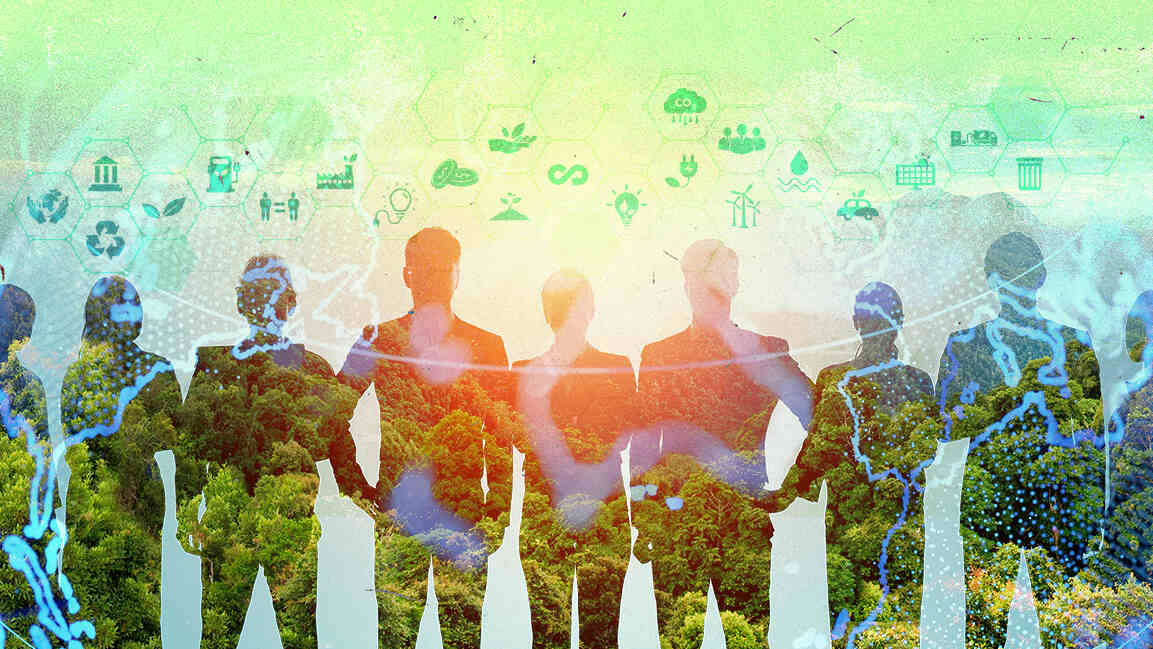- | 9:00 am
The future of the planet depends on green talent, says Allen Blue
The LinkedIn co-founder, who is attending COP28, expects AI and the green transition will be an important shaper of the labor market in 2024

Over the past couple of years, we’ve read articles that start with the dramatic inclusion of a crisis that has affected the talent economy. Whether AI is ushering in a new era of work, the unprecedented demand for green skills, the Great Resignation, or quiet quitting, it’s clear that people are recalibrating their lives and work. And this is creating a significant impact across the workplace.
And now, with global leaders gathering for COP28 in Dubai, climate change conversations must be matched with adequate support to upskill workers, including support for businesses to implement training programs and, ultimately, green jobs.
“There’s no time to waste – the planet’s future depends on green talent,” says Allen Blue, Co-Founder and VP of Product Management at LinkedIn, who is attending the annual climate meeting in Dubai.

GREEN TALENT: DEMAND OUTSTRIPS SUPPLY
Between January 2022 and January 2023, the UAE saw a 71% growth in green jobs; in Saudi Arabia, the growth was 67%. But companies are challenged by a lack of skilled talent, as there simply aren’t enough people with the skills needed to meet our climate needs.
“While the share of members with green skills is growing, the pace is not fast enough to meet the demand for green talent,” says Blue. “And unless we tackle this quickly, meeting ambitious climate targets will be challenging.”
According to Blue, employers in the UAE and Saudi Arabia are showing an unprecedented demand for green skills, far outstripping the available talent in the market.
While the UAE’s top 5 in-demand green skills are hazard communications, sustainable business, environmental compliance, water quality, and sustainability, in Saudi Arabia, in-demand skills are more varied. The country shows a high percentage of green talent in the construction sector but a lower adoption of green skills in the oil, gas, mining, and manufacturing sectors.
“Given that so many of these green skills and roles are new, people haven’t had a chance to learn the necessary skills for them yet. To meet our climate goals, we need to help the workforce keep up with this pace of change by identifying the most relevant green skills for each role and industry and developing targeted, tailored reskilling programs to help move people into green roles,” says Blue.
While there’s no specific data on whether people with green skills will likely be hired faster, Blue says companies seek workers with green skills.
“We can see that 4 in 5 people hired into green roles already have green skills or experience, so naturally, professionals with green skills have good chances of getting hired.”
LinkedIn data shows that the median LinkedIn hiring rate for workers with at least one green skill is 29% higher than the workforce average.
TOP SOFT SKILLS
As companies navigate the ever-changing world of work, focusing on skills is equally imperative to weather economic shifts and create a diverse and resilient workforce.
Blue says communication is critical. It’s the top soft skill leaders identified as necessary, followed by creative thinking, problem-solving, and empathy.
“At LinkedIn, we believe that a skills-first approach to hiring can offer tremendous benefits for both employers and employees by making the labor market more efficient and equitable,” he adds.
For business leaders looking to embrace skills-first hiring, Blue says they must map out the skills required for roles within their organization and empower their employees to develop their skills within the workplace through training, learning and development, and upskilling opportunities.
“Not only does this help with talent pipelines, offering opportunities for upskilling and internal mobility is also an important driver for employee retention.”
When asked about his playbook for retaining the best people, he says providing employees with opportunities to grow, learn, and use new skills is vital for retaining talent.
And if he could ask one question in a job interview, it would be about their appetite to learn new skills. “Skills are changing rapidly, and that’s only set to accelerate. Being open to learning, adapting, and embracing change is key.”
WORKPLACE TRENDS THAT WILL DEFINE 2024
When looking at the future, it feels like three themes emerge about how we come out of this crisis with a solution of companies optimizing their performance.
AI is accelerating a new era of work that will impact jobs, careers, and industries. Insights from LinkedIn’s Economic Graph team suggest that more than half of LinkedIn members have jobs that will be disrupted or augmented by AI, while the skill set required for our jobs will change by up to 65% by 2030.
Interestingly, since December 2022, the number of companies with a Head of AI position has grown by double-digits.
“We will continue to see broader AI integration across all sectors and industries,” he says.
In the UAE, most professionals predict AI will significantly change how they work in the next year alone. Executives believe that Gen AI will help remove repetitive and mundane tasks, improve productivity, and free up employees’ time for more creative and strategic tasks.
“I find it exciting that AI technologies will also give us more time to focus on the most human part of our jobs. Executives in key markets predict that human skills, such as problem-solving, strategic thinking, and leadership, will soar in demand. We also expect collaboration between teams to become even more central to individual and company success,” Blue adds.
Skills and workplace learning will be central to talent management in the future. Jobs are changing us, even if we’re not changing jobs. According to Blue, adopting a skills-first approach is also the best way to expand talent pools, upskill and engage current employees, and build agility into the workforce.
In 2024, he expects the green transition to remain an important shaper of the labor market. “Governments must commit to green skills to meet COP net zero targets and prepare the workforce and business for this generational shift in skills. Businesses will continue to push forward changes to reduce emissions and reach net zero, and they need the right talent to take them on this journey and future-proof their business.”







































